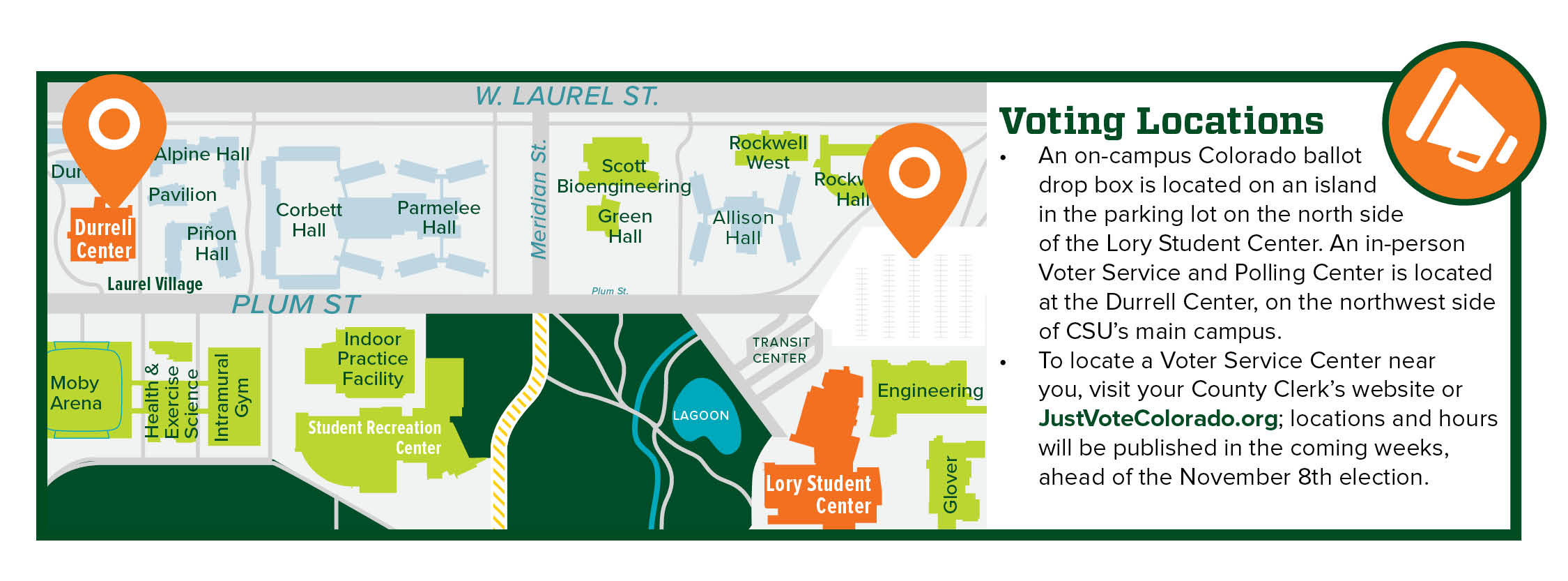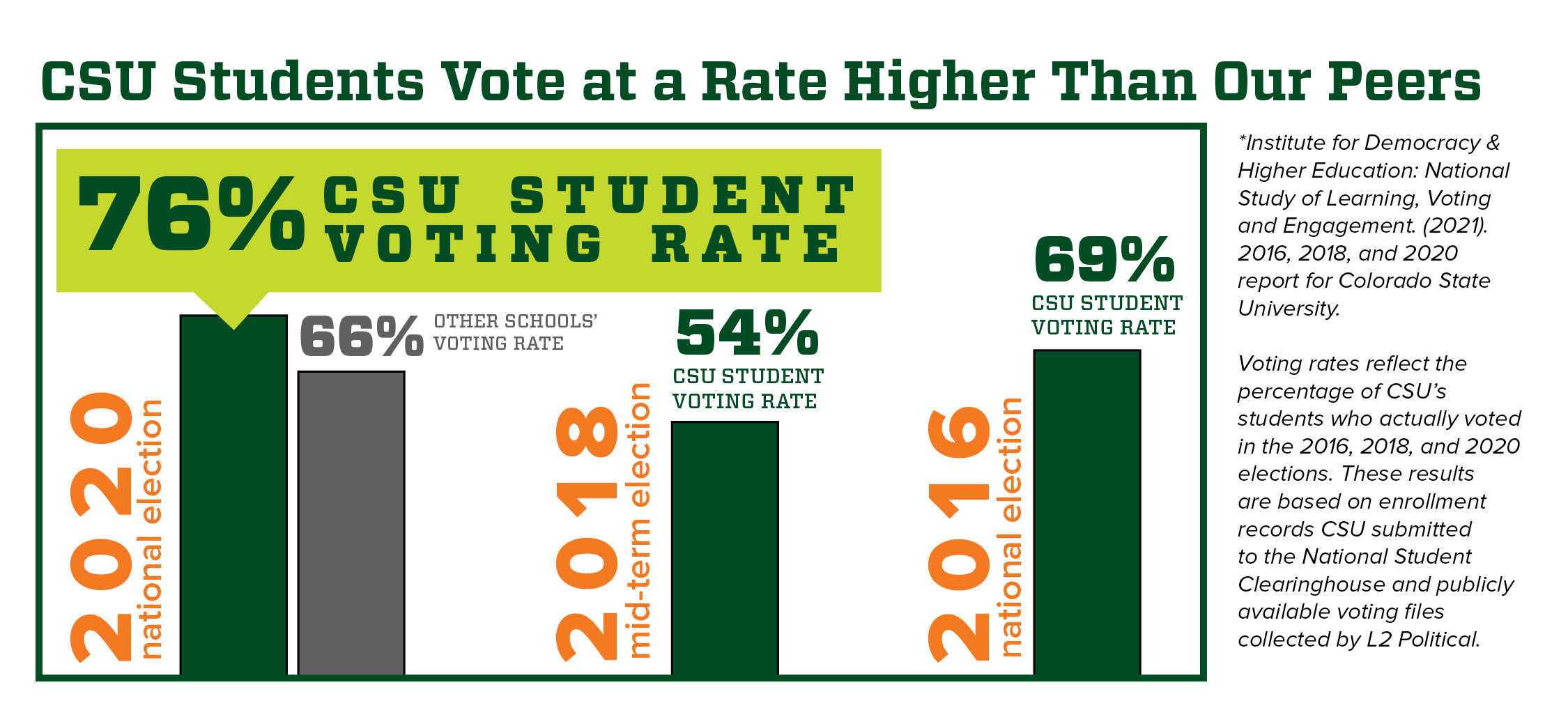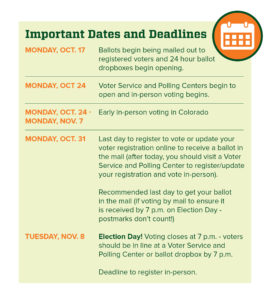
Colorado State University recently released a guide on voting and on-campus locations where ballots can be cast on or before the Nov. 8 election.
A print version of the guide ran as an insert in the Aug. 20 edition of the Rocky Mountain Collegian. A digital version is available as a pdf file online.
Below are some excerpts from the guide.
Voter registration
People can register easily online with the last four digits of their Social Security Number or their Colorado ID. Visit GoVoteColorado.gov to register to vote or update voter registration information. The ability to register with the last four digits of the SSN is a new opportunity that eligible students and employees are encouraged to use to conveniently register via phone or laptop.
Durrell Center voting location
Hours of operation:
- Monday, Oct. 24 to Friday, Oct. 28 – 8 a.m. to 5 p.m.
- Oct. 29-30 – closed
- Monday, Oct. 31 to Saturday, Nov. 5 – 8 a.m. to 5 p.m.
- Monday, Nov. 7 – 8 a.m. to 5 p.m.
- Tuesday, Nov. 8 – 7 a.m. to 7 p.m.
In Colorado, all eligible registered voters automatically receive a mail ballot and have the option to vote by mail, in-person or by ballot drop box. Voter registration must be updated each time one moves.
To identify one’s county, visit countymap.org. For information about registering or updating voter registration in a state other than Colorado, visit vote.usa.gov. Questions for the
Larimer County clerk can be directed to 970-498-7820 or elections@larimer.org.
Every eligible voter can complete the registration process online at GoVoteColorado.gov using the last four digits of their Social Security Number or Colorado ID.
Voters can also register in person at their county clerk’s office, by mail, at a Colorado Department of Motor Vehicles location, or during a voter registration drive. To be eligible to vote in Colorado, people must:
- Be a U.S. citizen
- Be 18 years old or older by Election Day (but people can register to vote as early as age 16)
- Live in Colorado at least 22 days before Election Day

Voting rights
If an election judge or anyone else challenges one’s right to vote at a Voter Service and Polling Center, they still have the right to cast a regular ballot. People who make an oath attesting to their eligibility to vote to an election judge must be allowed to cast a regular ballot. Those who don’t want to answer the questions about their eligibility still have a right to cast a provisional ballot.
Those who think their voting rights have been violated can advocate for themselves with the help of voting rights organizations and government officials. They should contact their county clerk’s office (www.countyoffice.org) and the Department of Justice (civilrights.justice.gov/report/).
 Creating political impact
Creating political impact
For those who are unable to vote in this country, and/or are from a mixed-status family and want to support their partner, relatives and friends, below are some ways to engage in the civic process. In fact, even for those who do vote, the following list contains ways to contribute to the political process:
- Speak to others about issues you are passionate about
- Encourage friends and family who are eligible to vote to exercise their rights
- Volunteer with local, regional, or national civic groups that address issues you care about
- Email or phone your local representatives
- Find a club that’s focused on an issue you care about – or create one
- Join a peaceful gathering or protest
- Use social media to express your views
- Engage in conversation with friends and classmates to share ideas or learn more
- Write a letter to the editor
- Organize a petition drive
- Get involved with a shared governance group like the Associated Students of CSU, Faculty Council, the Classified Personnel Council or the Administrative Professional Council
Election security
The following sites provide information on election security and what is being done to prevent fraud, hacking and interference:
- Colorado Secretary of State Election Security: www.coloradosos.gov/pubs/elections/electionInfo.html
- National Conference of State Legislatures: www.ncsl.org
- To report concerns about election integrity or the voting process, the nonpartisan Election Protection (866ourvote.org) offers the following hotlines:
- English (managed by the Lawyers’ Committee for Civil Rights Under Law): 1-866-OUR-VOTE (1-866-687-8683)
- Spanish (managed by the National Association of Latino Elected and Appointed Officials Educational Fund): 888-VE-Y-VOTA (1-888-839-8682)
Other resources
- Larimer County Elections Department: larimer.gov/clerk/elections or call 970-498-7820
- Per the Americans with Disabilities Act, Larimer County will provide a reasonable accommodation to qualified individuals with a disability who need assistance. Services can be arranged with at least seven business days’ notice. Email elections@co.larimer.co.us or call 970-498-7820 or Relay Colorado 711. Auxiliary aids and services will be honored to the extent possible but may be unavailable if advance notice is not provided.
- Track your ballot: colorado.ballottrax.net/voter/
- Those serving a sentence of parole may register to vote in Colorado.
- People experiencing homelessness or who are housing insecure have the right to vote. Those who don’t have a permanent home address need to check the voter registration box as “homeless.” Residency address can be the address of a homeless shelter, relative/friend’s home address, park, or street intersection. www.sos.state.co.us/pubs/elections/vote/displacedVoters.html
www.coloradosos.gov/pubs/elections/vote/acceptableFormsOfID.html - Voter registration data is generally public. Many states operate special programs for domestic violence and sexual assault survivors to help keep their residency information private. Learn more at www.nonprofitvote.org/voting-and-domestic-violence/ (also available in Spanish).
- Those who will be abroad for the election (i.e., military service, studying abroad or traveling) need to fill out a Federal Post Card Application (www.fvap.gov/military-voter), send it to their local election office, and then cast their vote using their state’s absentee or mail-in voting system.